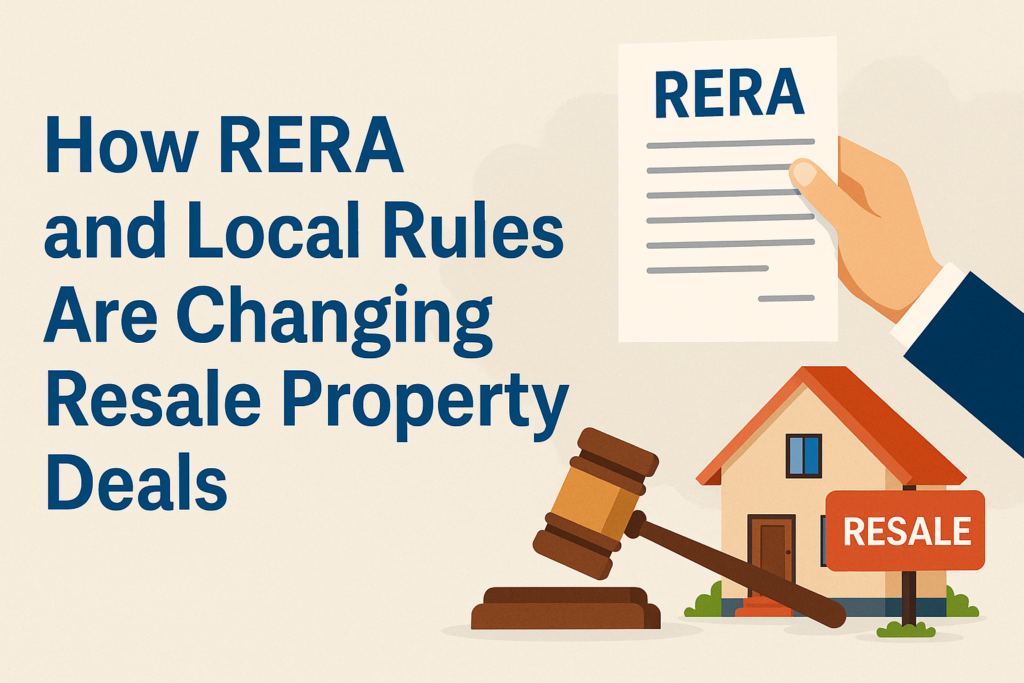
RERA impact on resale property transactions has become a hot topic among homebuyers, sellers, and real estate investors in India. While RERA (Real Estate Regulatory Authority) was originally launched to regulate new property developments, its influence now extends to the resale market as well. Combined with local municipal policies, RERA has brought both clarity and structure to how resale property transactions take place.
In this blog, we’ll explore how these rules have changed the way resale deals are handled, and what it means for both buyers and sellers in the Indian real estate sector.
How RERA Has Changed Resale Property Transactions
Since its introduction in 2016, RERA has improved accountability and transparency in the real estate industry. But what about the secondary real estate market? Surprisingly, RERA’s influence on resale properties has been significant in the following ways:
1. Improved Buyer Confidence and Transparency
Earlier, buyers of resale properties often relied solely on the seller’s word or outdated paperwork. Today, RERA allows them to verify the project’s registration details, completion status, and legal approvals—even if the property is being resold.
2. Legal Compliance and Document Verification
Under the RERA framework, all original property documents—such as the sale deed, possession letter, and occupancy certificate—must be in place. This is especially helpful in resale property documentation under RERA, making transactions smoother and reducing risks.
3. Clarity in Carpet Area and Pricing
One of the major contributions of RERA is its clear definition of carpet area. Whether it’s a new property or a resale one, pricing based on carpet area ensures transparency and fair property valuation, which is critical in the resale segment.
The Role of Local Municipal Policies in Resale Property Transactions
Apart from RERA, local municipal regulations also have a direct impact on resale property dealings. These policies vary by city but typically cover aspects like taxation, building permissions, and ownership transfer protocols.
1. Property Tax Clearance
Municipal authorities require that all outstanding property taxes be cleared before a resale. This step ensures the buyer doesn’t inherit any unpaid dues and encourages clean resale transactions.
2. Verification of Building Approvals
Many resale properties are located in older buildings. Municipal bodies help ensure that these structures have valid occupancy and building completion certificates, reducing risk for the new buyer.
3. Transfer Charges and Society NOCs
In many cities, housing societies must issue a No Objection Certificate (NOC) before a resale can take place. Municipal guidelines regulate these charges, ensuring that buyers are not overcharged or misled
Pros and Cons of Regulatory Influence on Resale Transactions
| Benefits | Challenges |
|---|---|
| More secure and transparent transactions | Longer paperwork and verification process |
| Verified documentation and legal compliance | Some older properties may lack RERA registration |
| Better pricing based on clearly defined carpet area | Additional municipal procedures before transfer |
Final Thoughts: A Better Resale Experience for All
The RERA impact on resale property transactions, paired with strong local municipal policies, has largely been positive. While it may involve a bit more paperwork and verification, these changes have made the resale process safer, cleaner, and more buyer-friendly.
If you’re planning to enter the resale market—whether to buy or sell—don’t skip

Join The Discussion